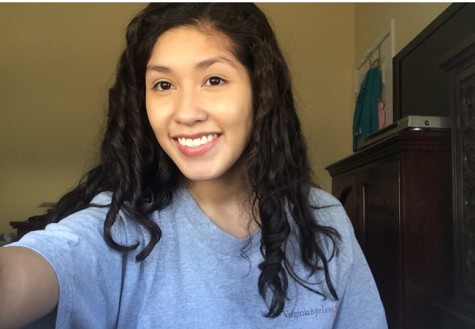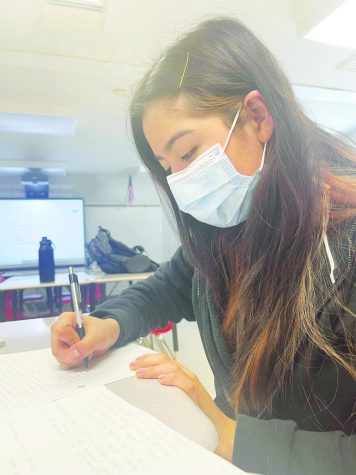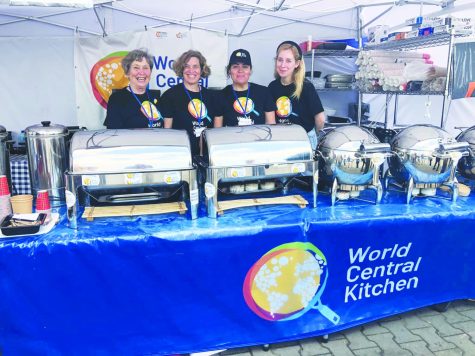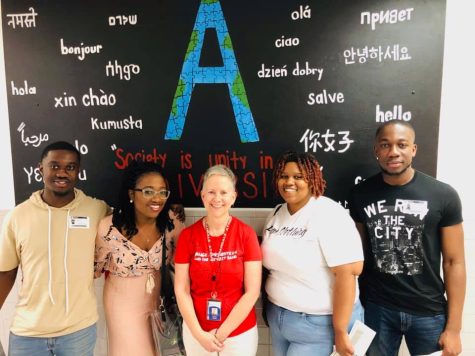Living under the poverty line
Baek and his family pose for senior night.
Senior Peter Baek vaguely remembers being homeless for around a week. In 2008, he was still too young to understand the difficulties his family was going through. They kept it a secret to him and his sister.
“They [my parents] tried to cover up and say that we were actually just moving because they wanted to move to a different house, but now that I know that it was by property swindlers, I realize how much we struggled back then,” Baek said.
After his family lost their home in Fairfax to property swindlers, they were left without a place to call their own.
“When went to my relatives’ house for a while and then we found a rent home we are still in today,” Baek said.
Baek was born in Korea and when he was about 100 days old, his parents immigrated back to the U.S. to raise Baek. His family had to move when the international monetary crisis hit Korea.
“[My father] wanted to become a photographer initially. After he found out he couldn’t do it in Korea, he followed the American dream and came to America,” Baek said.
Ever since moving from Korea, his family has had to deal with poor economy.
“It has been generally okay up until I think since starting high school. It has been sort of rough in the sense that the money does go up and down and you never know what is coming up next.”
His father was able to start up a photography business but it has not been enough to support their family.
“My mom used to be a stay at home [mom], but since the economy has been going so bad she has been doing part time jobs right now. Right now she works at a laundromat.”
Baek is one of roughly 60 percent of AHS students who can be identified as “in poverty.”
Several students have similar struggles to Baek’s family and while the government locally and nationally attempt to provide for those who have low income, the problem is steadily increasing overtime.
Approximately 16 million children in the U.S. are considered impoverished. The rate of poverty has been steadily increases for the past 20 years and is moving towards an alarming number.
According to the National Center for Children in Poverty (NCCP), a family of four whose household income is $23,505 or less is considered impoverished. In theory, a family of four can live comfortably if they earn at least $44,700 a year. School expenses, clothing, shelter and food can be covered with $44,700. However, that goal is almost double of what many household can make.
According to the NCCP, “86 percent of children with parents who have less than a high school degree, 7.4 million live in low-income families.”
The correlation between the amount of education and the annual salary is large reason why students may struggle with money.
“My dad and my mom’s family grew up in Korea. My mom’s entire family moved to America after she graduated high school and she went to FIT, Fashion Institute of Technology in New York,” Baek said. “My dad, his family stayed in Korea, but him and his brother came to California to pursue photography in Santa Barbara and for some reason he moved to the east coast and they were working at a photography place as a part time [job].
A parent or guardian who works minimum wage may find themselves struggling to provide all the necessities needed to raise their child. In Virginia, $7.25 is the minimum wage and there are some who
believe that it is not enough for a family to live comfortably.
Especially with the holiday season coming up, some students are trying to apply for seasonal jobs to have a little extra money to spare. However, families with a similar status or worse than to Baek’s, this time of year can seem like a struggle to live without extravagant items.
Some students, even though they live with low income, do not apply for free reduced lunch. Sometimes they feel too embarrassed apply because they do not want to identified as poor.
“To be honest about being low income, I know a lot of people think of it as a disadvantage and are really embarrassed by it but for me I think it sort of defines me in the aspect that without being low income I would not have found my interest in science because of that driven quality to make ends meet for my family,” Baek said.
Free and Reduced Lunch can help students and their family move forward and Choo believes the stigma attached should be overlooked.
“I think that is ridiculous. I think that if you have somewhere you want to be, I think you should take the steps to get there.”
While Baek is disadvantaged by being low income, he manages to find a positive outlook and sees the benefits his life has given him.
“So when they ask me if I am low income, I don’t try to hide it. I think I am very open about it, but I am not going to go around saying ‘hey I am low income’, but if they ask I am in the sense proud of it because even though I have been living in those circumstances I have come this far,” Baek said. “I think that is from the driven passion I have and the support from my family.”
However, the benefits from the Free and Reduced Lunch Program can help a family not spend too money on school supplies or musical instrument and use that saved money to pay for their house or buy food. Breakfast meals for K-12 is $1.25 and lunch is $3.00 for high schoolers. Even a daily spending of a few more dollars can hurt a family who is conscientious of money.
“[The Free and Reduced Lunch Program] has been really helpful. People don’t like being low income but especially for college [application] waivers, like SAT or ACT; everyone is like ‘I wish I was low income’, but I don’t think they understand what being low income life is like, but I guess that is an advantage to that.” Baek said.
Free and Reduced Lunch can also help students with college preparations. Most colleges require a SAT or ACT score to be submitted. Students who may not be able to afford the fee by College Board and have Free and Reduced Lunch can ask their counselors for a waiver that will eliminate the costs. Schools can also help pay for college applications once seniors are ready to apply since to several colleges can run to the hundreds.
However, the several benefits from college can only extend to a certain of number low income students. Those who do not have an American citizenship will have to face the realities of paying for college without as much financial help.
“Well there is college tuition and also I am not an American citizen so I can’t get a lot of financial aid.”
Originally born in Singapore, Senior Vera Choo’s’ parents brought her over to the U.S. when she was about six months old.
Her two bedroom home holds six people. Choo notices that there are times where her home feels overcrowded
According to the NCCP, overcrowding in homes is not common in many households, five percent of those who are not as financially well off experience overcrowding in homes.
“Well, I don’t have my own room, which is kind of annoying and I think it would be nice [to have my own]. We don’t really have [space], we kind of just our stuff on the floor outside. We used up all the closet space.”
While Choo and Baek are not as financially well off as others, they still have aspirations which they plan to go after without letting money be a challenge to them.
“Being low income, as I think about the future, I don’t want to let that hinder my interests and passion. Right now I am part of the Questbridge Program which is a scholarship program for low income students and I definitely want look into more programs like that as I continue my education because I don’t want to burden my parents with the tuition,” Baek said.
Choo has several career choices in mind which changes frequently, but takes interest in forensic science.
“William and Mary is my first choice. I want to stay in state, but there are not a lot of schools in Virginia with a Classics program, which is what I want to major in,” Choo said. “I just want to study full time because I don’t think I can balance a job and study full time at the same time, but then you are left in debt at the end of it.”
Choo chooses not to worry too much about paying for college.
“I am just kind of hoping it will figure itself out,” Choo said.
Baek aims to utilize his experiences he has gone through to reach his goals.
“I am not going let my low income status hinder me, but I want to use that as a catalyst for future aspirations; going after and getting scholarship and going above and beyond,” Baek said. “I know most people perceive it as a negative aspect, but try to turn that around into a positive meaning in your life.”

Berta is currently a senior. She has been on The A-Blast since her freshmen year and was first an Academics Editor during sophomore year and then became...








